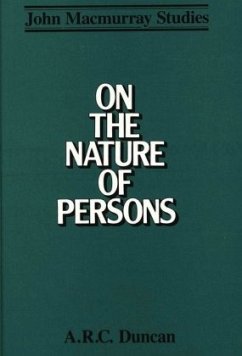This book, an introduction to the thought of the Scottish philosopher John Macmurray (1891-1976), focusses on the problem: are human beings merely animals with unusually highly developed brains or are they properly thought of as persons. Professor Duncan traces how Macmurray's understanding of the twentieth century forced this problem on his attention. This led Macmurray to revise accepted ideas about human rationality and freedom. It resulted in his adoption of a radically new and empirically based approach to religion. Macmurray challenges contemporary philosophers to shift their centre of gravity away from Cartesian egocentricity and to learn to think from the standpoint of the self, not as theoretical spectator, but as active agent.
"The passage of time has not diminished the importance of John Macmurray's reflections on what it means to be a person. Professor Duncan writes with an exceptional clarity of style and command of the material. This non-technical overview of Macmurray's writings will help to keep the philosophical issue before the public, and in focus." (A.P. Fell, Queen's University)
"Macmurray rejects Descartes' 'thinking self' and opts to start and end philosophy with 'persons in relation'. Duncan gives us a compelling, clear and totally readable insider's view of this Copernican revolution. He traces masterfully the dividing line Macmurray has drawn between 'modern' and 'contemporary' thinking." (John E. Costello SJ, President of Regis College in The Toronto School of Theology)
"Macmurray rejects Descartes' 'thinking self' and opts to start and end philosophy with 'persons in relation'. Duncan gives us a compelling, clear and totally readable insider's view of this Copernican revolution. He traces masterfully the dividing line Macmurray has drawn between 'modern' and 'contemporary' thinking." (John E. Costello SJ, President of Regis College in The Toronto School of Theology)

